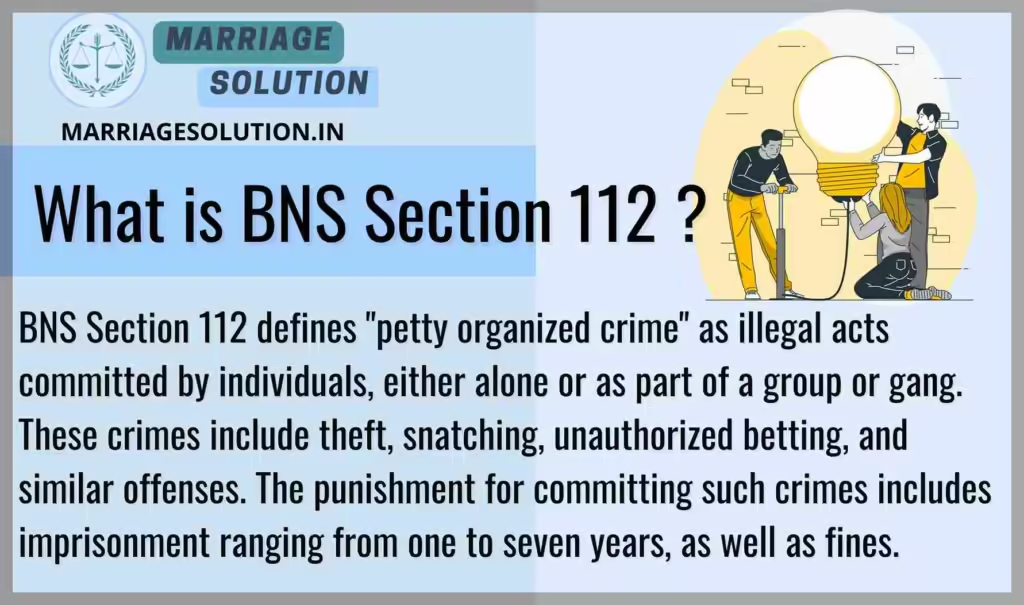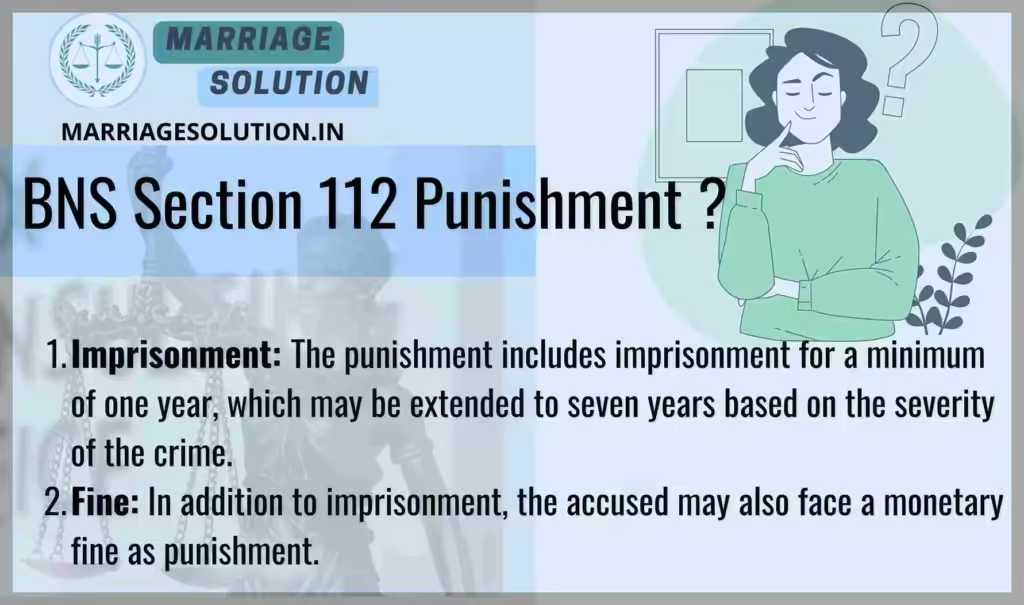Introduction of Section 112 BNS
Not all crimes are major offences like murder or large-scale organised crime. Many unlawful acts are smaller in scale but still disturb society when done repeatedly or in groups. Section 112 of the Bharatiya Nyaya Sanhita (BNS) deals with such petty organised crimes — theft, snatching, cheating, exam paper leaks, shoplifting, and illegal betting. The law recognises that even these smaller crimes, when committed in an organised way, can cause widespread harm. Therefore, strict punishments are imposed, including imprisonment from 1 year to 7 years and fines, to discourage individuals and gangs from engaging in such activities.
What is BNS Section 112 ?
BNS Section 112 defines “petty organized crime” as illegal acts committed by individuals, either alone or as part of a group or gang. These crimes include theft, snatching, unauthorized betting, and similar offenses. The punishment for committing such crimes includes imprisonment ranging from one to seven years, as well as fines.

BNS Act – BNS Section 112
Whoever commits petty organised crime, either individually or as part of a group or gang, including acts such as theft, snatching, cheating, unauthorised betting, selling of public examination papers, shoplifting, or other similar unlawful acts, shall be punished with imprisonment of not less than one year, which may extend to seven years, and shall also be liable to fine.
1. What is Petty Organised Crime?
This section defines petty organised crime as smaller but repeated or systematic unlawful acts. Examples include theft, cheating, snatching, or gambling. Even though they may not appear as serious as organised crime syndicates (covered in Section 111), these activities affect ordinary people daily.
2. Different Types of Offences Covered
The law covers a wide range of acts:
- Pickpocketing and trick thefts
- Shoplifting and ATM thefts
- Cargo theft from trucks or warehouses
- Snatching bags, chains, or mobile phones
- Selling leaked exam papers for profit
- Running unauthorised betting or gambling rings
Example: A gang stealing goods from delivery vans is guilty under Section 112.
3. Who Can Be Punished?
Both individuals and group members are liable. Even a single person committing theft, if linked to a gang, falls under this section.
Example: A student selling leaked university papers is punishable even if he acts alone.
4. Punishment Under Section 112
- Minimum imprisonment: 1 year
- Maximum imprisonment: 7 years
- Fine: Mandatory (amount fixed by court)
Example: A person running a cricket betting racket may face 5 years in jail + fine.
5. Legal Nature of the Offence
Cognizable: Police can arrest without a warrant.
- Non-Bailable: Bail is not easily granted.
- Non-Compoundable: Cannot be privately settled.
- Trial: Conducted by a Magistrate of the First Class.
6. Why This Section is Important
Petty organised crimes may appear small, but they:
- Cause financial loss and insecurity to ordinary citizens
- Encourage criminal networks at the local level
- Create a climate of fear in public spaces
By making these crimes non-bailable and punishable up to 7 years, the law ensures that offenders cannot escape easily.
Examples of Section 112 in Action
- Example 1 (Pickpocketing – Offence): A group of thieves regularly steals wallets on trains. They are punishable under Section 112.
- Example 2 (Exam Paper Leak – Offence): A coaching institute leaks board exam papers for money. The offenders are guilty under Section 112.
- Example 3 (Illegal Betting – Offence): A person runs an underground gambling setup during cricket matches. This qualifies as petty organised crime.
- Example 4 (Not Applicable – Accident): A man accidentally breaks someone’s phone. Since there is no criminal intent or organised activity, Section 112 does not apply.
Section 112 BNS Overview
BNS Section 112 defines petty organized crime as any act of theft, snatching, cheating, unauthorized selling of tickets, gambling, or other similar illegal activities committed by individuals as part of a group or gang. It covers a range of theft types, including pickpocketing, trick theft, shoplifting, and cargo theft. The section ensures that these crimes are punishable with strict imprisonment and fines.
10 Key Points Explained in Detail – BNS Section 112
- Definition of Petty Organized Crime:
BNS Section 112 defines “petty organized crime” as the act of committing minor criminal offenses as part of a group or gang. These offenses include theft, snatching, cheating, and unauthorized betting, typically carried out in a systematic manner by individuals or groups working together. - Types of Theft Covered:
The section explains that petty organized crime includes various types of theft, such as trick theft, theft from vehicles or homes, cargo theft, pickpocketing, card skimming, shoplifting, and theft from Automated Teller Machines (ATMs). This wide definition ensures that all forms of organized theft are addressed. - Group or Gang Involvement:
The section highlights that even when petty crimes are committed by a single individual, if they are a part of a larger group or gang involved in criminal activities, the offense is classified under petty organized crime. This targets coordinated efforts among criminals. - Punishment for Petty Organized Crime:
The punishment for committing petty organized crime under this section includes imprisonment for a minimum term of one year, which can be extended up to seven years depending on the severity of the crime. In addition to imprisonment, offenders may also face fines. - Non-Bailable Offense:
Crimes classified under Section 112 are non-bailable, meaning the accused cannot easily secure bail. They must face judicial scrutiny, and bail can only be granted under special circumstances as deemed fit by the court. - Cognizable Offense:
The section states that petty organized crimes are cognizable, meaning the police have the authority to arrest the suspect without a warrant. This allows for swift action when such crimes are suspected or discovered. - Types of Other Offenses Included:
Apart from theft, other petty crimes like unauthorized selling of public examination papers, unauthorized betting, and cheating are also considered under petty organized crime. These acts disrupt public order and fairness and are dealt with seriously. - Role of the Magistrate:
Cases under Section 112 are handled by the Magistrate of the first class. This means that the trial will be held in a lower court with quicker resolution compared to higher courts, ensuring that petty organized crime cases are dealt with efficiently. - Examples of Crimes:
Petty organized crime under this section could include activities like running a small betting ring, where individuals participate in unauthorized gambling. Another example could be a group working together to steal and sell public examination papers for profit. - Protection of Public Interest:
Section 112 aims to protect the public from organized criminal activity that, although petty, has a widespread negative impact
BNS 112 Punishment
Imprisonment: The punishment includes imprisonment for a minimum of one year, which may be extended to seven years based on the severity of the crime.
Fine: In addition to imprisonment, the accused may also face a monetary fine as punishment.

BNS 112 bailable or not ?
Non-Bailable: Offenses under BNS Section 112 are non-bailable, meaning the accused cannot automatically obtain bail and must appeal to the court for bail consideration.
Comparison: BNS Section 112 vs IPC Sections (378, 379, 420, 411)
| Section | Offense | Punishment (No Harm) | Punishment (With Harm) | Bailable? | By What Court Triable |
|---|---|---|---|---|---|
| BNS Section 112 | Petty organised crime (theft, snatching, cheating, betting, exam paper leaks, shoplifting, cargo theft, ATM theft) | Imprisonment not less than 1 year (may extend to 7 years) + fine | Same punishment (organised petty crimes treated seriously) | Non-bailable | Magistrate of the First Class |
| IPC Section 378 / 379 | Theft / Snatching | Imprisonment up to 3 years, or fine, or both | Not separately covered (same punishment) | Bailable | Magistrate |
| IPC Section 420 | Cheating & dishonestly inducing delivery of property | Imprisonment up to 7 years + fine | Same punishment (depends on case) | Non-bailable | Magistrate |
| IPC Section 411 | Dishonestly receiving stolen property | Imprisonment up to 3 years, or fine, or both | Not separately covered | Bailable | Magistrate |
BNS Section 112 FAQs
What is considered petty organized crime under BNS Section 112?
Petty organized crime includes theft, snatching, unauthorized betting, cheating, and similar acts committed by a person or group.
What is the punishment under BNS Section 112?
The punishment includes imprisonment of at least one year, which may extend to seven years, and also fines.
Are crimes under BNS 112 bailable?
No, offenses under Section 112 are non-bailable.
Can the police arrest without a warrant under Section 112?
Yes, the offense is cognizable, meaning the police can arrest without a warrant.
What kind of thefts are included in BNS Section 112?
It includes trick theft, pickpocketing, shoplifting, cargo theft, and ATM thefts.
Who handles the trial for offenses under Section 112?
A Magistrate of the first class handles the trials for offenses under this section.
Need Legal Support?
If you’re facing court proceedings, marriage-related issues, or any legal matter, our team at Marriage Solution – Lawyer Help is ready to guide you. Just complete our easy online enquiry form, and we’ll connect you with the right legal assistance tailored to your needs.
Conclusion
BNS Section 112 plays a crucial role in maintaining law and order by punishing petty organised crimes. Offences like theft, cheating, exam paper leaks, and illegal betting may seem minor individually, but when carried out systematically or by groups, they harm society at large. By making the offence non-bailable, cognizable, and punishable with 1–7 years of imprisonment plus fines, the law sends a strong message that even small-scale organised crimes will not be tolerated.
Finished with BNS 112 ? Continue exploring the next provisions of the Bharatiya Nyaya Sanhita (BNS), 2023. Each section includes explanations, examples, and plain-language breakdowns for easy understanding.
- BNS 113 : Terrorist act.
- https://marriagesolution.in/bns_section/bns-113/
- Section 114 BNS : Hurt .
- https://marriagesolution.in/bns_section/section-114-bns/
- BNS 115 : Voluntarily causing hurt .
- https://marriagesolution.in/bns_section/bns-115/
- BNS 116 : Grievous hurt
- https://marriagesolution.in/bns_section/bns-116/
- BNS 117 : Voluntarily causing grievous hurt .
- https://marriagesolution.in/bns_section/bns-117/
Full IPC Section List: https://marriagesolution.in/ipc-section-list
All Indian Law & Blogs: https://marriagesolution.in/indian-law/
Full BNSS Section List: https://marriagesolution.in/bnss_section-list
